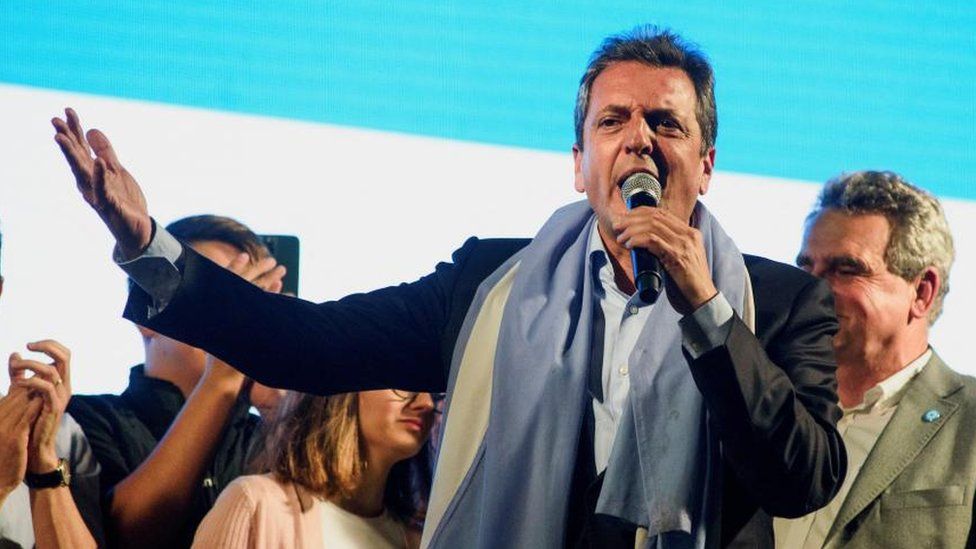
In a major development in Latin American politics, defying all opinion poll projections, the candidate of the ruling centre left Peronist coalition Sergio Massa trounced the far right challenger Javier Milei in the first round of Presidential elections held on Sunday, October 22. Since no candidate out of the contesting five got more than the stipulated 45 per cent of the votes, the runoff will take place on November 19 this year to elect the President between Massa and Milei, the first and second vote getters.
Massa had 36.6% of the vote, ahead of Milei on just over 30%, while conservative Patricia Bullrich was behind on 23.8% with near 98% of the vote counted, a result that defied pre-election polls that had predicted a win for Javier Milei , a libertarian who stands for unbridled expansion of private sector. The big difference of 6.2 per cent in the voting figure is considered significant since the ruling coalition candidate was facing serious problems during the election campaign due to the high inflation and joblessness among the youth.
For Massa, the runoff fight has emerged as a big challenge as he will have to get the majority of the votes to be elected. If the 23.8 per cent of the votes received by the conservative third candidate Patricia Bullrich is added, with the far right Milei, then he will have an easy victory. So Massa has to get votes from the conservatives also as also from the other sections of the Left represented by the Socialist Workers Party candidate Myriam Bregman.
While far right candidate Milei has proposed dollarizing the economy and closing down the central bank and opening up to the multinationals in key sectors of the economy, the ruling candidate Massa was sober in his approach underlining on the pro poor schemes and the subsidies for the low income group.. He admitted the lapses of the Peronist government in curbing the high inflation but assured that the ruling coalition will be taking suitable steps to control price rise after coming to power.
Milei, in a defiant speech after the result, said he would fight on to win in the second round next month.”We are faced with the most important election of the last 100 years,” he said. “If we work together we can win, if we work together we can recover our country.”
Massa has been a leading figure in the center-left administration in power since 2019. He successfully focused messaging on the way in which Milei’s proposal to slash the size of the state — from halving the number of government ministries to deep spending cuts — would affect everyday life for Argentines.
Andrei Roman, CEO of Brazil-based pollster Atlas Intel, whose latest survey was one of few showing Massa ahead, said one key to the result was lower abstention than in the primary elections held in August. Around 78% of the electorate voted Sunday, some eight points higher than in the primaries that Milei won, sending shockwaves through the nation.
Milei, a self-described anarcho-capitalist who admires former U.S. President Donald Trump, amassed a groundswell of support while calling for elimination of the Central Bank, replacement of the local currency with the U.S. dollar, and a purge of the establishment that he called the “political caste.”
Massa focused much of his firepower in the campaign’s final days on warning voters against backing Milei, painting him as a dangerous upstart. He argued that Milei’s plans could have devastating effects on social welfare programs, education and health care. The health, education and social development ministries are among those Milei wants to extinguish.
Milei also cast himself as a crusader against what he called the sinister forces of socialism at home and abroad. He opposes sex education, feminist policies and abortion, which is legal in Argentina. He rejects the notion that humans have had a role in causing climate change.
Argentina is a vast country located in the southern part of South America. The eighth largest country in the world, it is the second largest country in South America after Brazil, and it’s about one-third the size of the United States. Argentina is bordered by the Andes Mountains and Chile to the west.
To the east of the Andes, the interior of the country is flat, fertile grassland called the Pampas. The eastern border of the country is the Atlantic Ocean. Bolivia is to the northwest and Paraguay is to the north. The high mountain spine of the Andes, called the Andes Cordillera, creates a natural 3,195-mile (5,141.9-kilometer) border with Chile.
The country is divided into four regions: The Andes, the North, the Pampas, and Patagonia. The Pampas is the agricultural heartland. The country is a federal republic. There have been several democratically elected presidents after many years of political turmoil.
The National Congress is made of the Senate with 72 seats and the Chamber of Deputies with a total of 257 seats. There are seven judges in the Supreme Court, but that number will be reduced to five over the next few years. The president picks the judges and the senate must approve their appointments.
For the Latin American progressives, the victory of the ruling coalition candidate Sergio Massa in run off on November 19 is of crucial significance. Only on October 15, in the presidential elections, the left wing candidate Luisa Gonzalez was defeated by the right candidate. If the centre left can retain the presidency on November 19 elections, that will give a big boost to the Left wing forces of the region. Already Mexico and Brazil are headed by left wing presidents. Argentina is the second largest country in this trio. (IPA Service)
The post Peronist Sergio Massa Emerges Number One In Presidential Elections In Argentina first appeared on Latest India news, analysis and reports on IPA Newspack.


